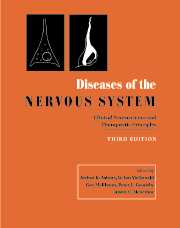Book contents
- Frontmatter
- Dedication
- Contents
- List of contributors
- Editor's preface
- PART I INTRODUCTION AND GENERAL PRINCIPLES
- PART II DISORDERS OF HIGHER FUNCTION
- PART III DISORDERS OF MOTOR CONTROL
- PART IV DISORDERS OF THE SPECIAL SENSES
- PART V DISORDERS OF SPINE AND SPINAL CORD
- PART VI DISORDERS OF BODY FUNCTION
- PART VII HEADACHE AND PAIN
- PART VIII NEUROMUSCULAR DISORDERS
- PART IX EPILEPSY
- PART X CEREBROVASCULAR DISORDERS
- 79 Physiology of the cerebral circulation
- 80 Stroke syndromes
- 81 The treatment of acute ischemic stroke
- 82 Behavioural manifestations of stroke
- 83 Intracerebral hemorrhage
- 84 Aneurysms and arteriovenous malformations
- 85 Hereditary causes of stroke
- 86 Preventive management of stroke
- PART XI NEOPLASTIC DISORDERS
- PART XII AUTOIMMUNE DISORDERS
- PART XIII DISORDERS OF MYELIN
- PART XIV INFECTIONS
- PART XV TRAUMA AND TOXIC DISORDERS
- PART XVI DEGENERATIVE DISORDERS
- PART XVII NEUROLOGICAL MANIFESTATIONS OF SYSTEMIC CONDITIONS
- Complete two-volume index
- Plate Section
85 - Hereditary causes of stroke
from PART X - CEREBROVASCULAR DISORDERS
Published online by Cambridge University Press: 05 August 2016
- Frontmatter
- Dedication
- Contents
- List of contributors
- Editor's preface
- PART I INTRODUCTION AND GENERAL PRINCIPLES
- PART II DISORDERS OF HIGHER FUNCTION
- PART III DISORDERS OF MOTOR CONTROL
- PART IV DISORDERS OF THE SPECIAL SENSES
- PART V DISORDERS OF SPINE AND SPINAL CORD
- PART VI DISORDERS OF BODY FUNCTION
- PART VII HEADACHE AND PAIN
- PART VIII NEUROMUSCULAR DISORDERS
- PART IX EPILEPSY
- PART X CEREBROVASCULAR DISORDERS
- 79 Physiology of the cerebral circulation
- 80 Stroke syndromes
- 81 The treatment of acute ischemic stroke
- 82 Behavioural manifestations of stroke
- 83 Intracerebral hemorrhage
- 84 Aneurysms and arteriovenous malformations
- 85 Hereditary causes of stroke
- 86 Preventive management of stroke
- PART XI NEOPLASTIC DISORDERS
- PART XII AUTOIMMUNE DISORDERS
- PART XIII DISORDERS OF MYELIN
- PART XIV INFECTIONS
- PART XV TRAUMA AND TOXIC DISORDERS
- PART XVI DEGENERATIVE DISORDERS
- PART XVII NEUROLOGICAL MANIFESTATIONS OF SYSTEMIC CONDITIONS
- Complete two-volume index
- Plate Section
Summary
This chapter focuses on mendelian disorders with stroke as part of the clinical syndrome. Within recent years most of the major gene loci have been mapped. In some instances this has allowed a new nosologic classification. Many of the genes have been cloned, thus allowing a direct diagnosis in the index patient and its relatives. Moreover, the cloning of the genes has provided new insights into the molecular mechanisms underlying these disorders. Thus for example the identification of genes implicated in CADASIL and familial cavernoma revealed cell signalling pathways involved into angiogenesis.
In order to recognize mendelian stroke syndromes it is essential to perform a systematic family inquiry and to search for neurological and non-neurological signs and symptoms in index cases and relatives. The diagnosis may have implications both for therapeutic decisions and genetic counselling. At present, there is no uniform classification for mendelian stroke syndromes. Criteria that may be useful for clinical practice include the type of stroke, the presence or absence of associated symptoms, and the mode of inheritance. The chapter gives a summary of actual data regarding clinical, genetic and physiopathological aspects of these conditions.
Monogenic disorders with stroke as the prevailing manifestation
Conditions causing ischemic stroke
CADASIL
CADASIL (cerebral autosomal dominant arteriopathy with subcortical infarcts and leukoencephalopathy) is an autosomal dominantly inherited small vessel disease causing stroke in young adults. Previous descriptions of families with ‘hereditary multi-infarct dementia’, ‘chronic familial vascular encephalopathy’, and ‘familial subcortical dementia’ represent early reports of the same condition. In 1993, Tournier-Lasserve et al. mapped the gene on chromosome 19 and coined the acronym CADASIL (Tournier-Lasserve et al., 1993). Since then numerous families have been reported from all over the world.
Clinical manifestations include recurrent ischemic episodes (TIAs and strokes; 80%), cognitive deficits (50%), and migraine (40%) mostly with aura, as well as psychiatric disorders (30%) and epileptic seizures (10%) (Dichgans et al., 1998). Onset of ischemic symptoms is usually in midadulthood (mean age: 46.1 years). Magnetic resonance imaging reveals a combination of small lacunar lesions and diffuse white matter abnormalities (Fig. 85.1).
- Type
- Chapter
- Information
- Diseases of the Nervous SystemClinical Neuroscience and Therapeutic Principles, pp. 1405 - 1414Publisher: Cambridge University PressPrint publication year: 2002



